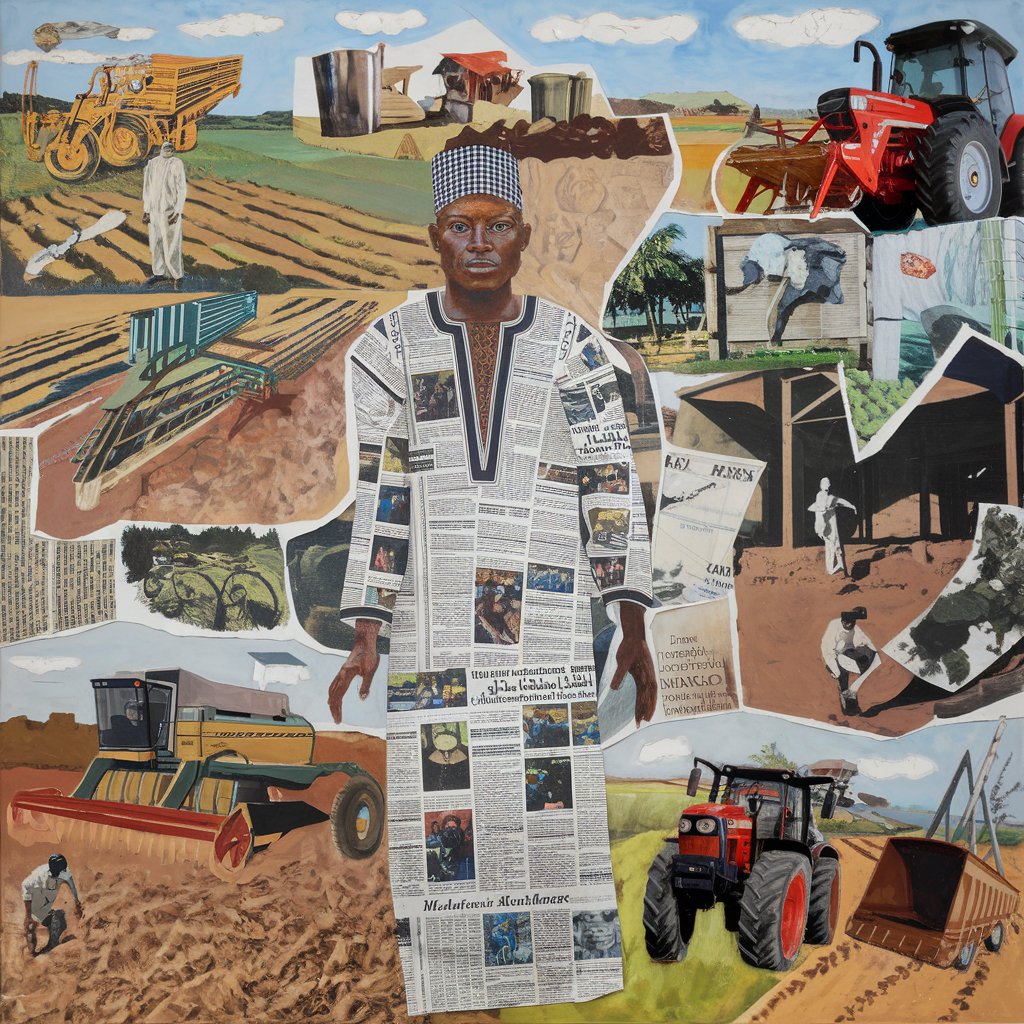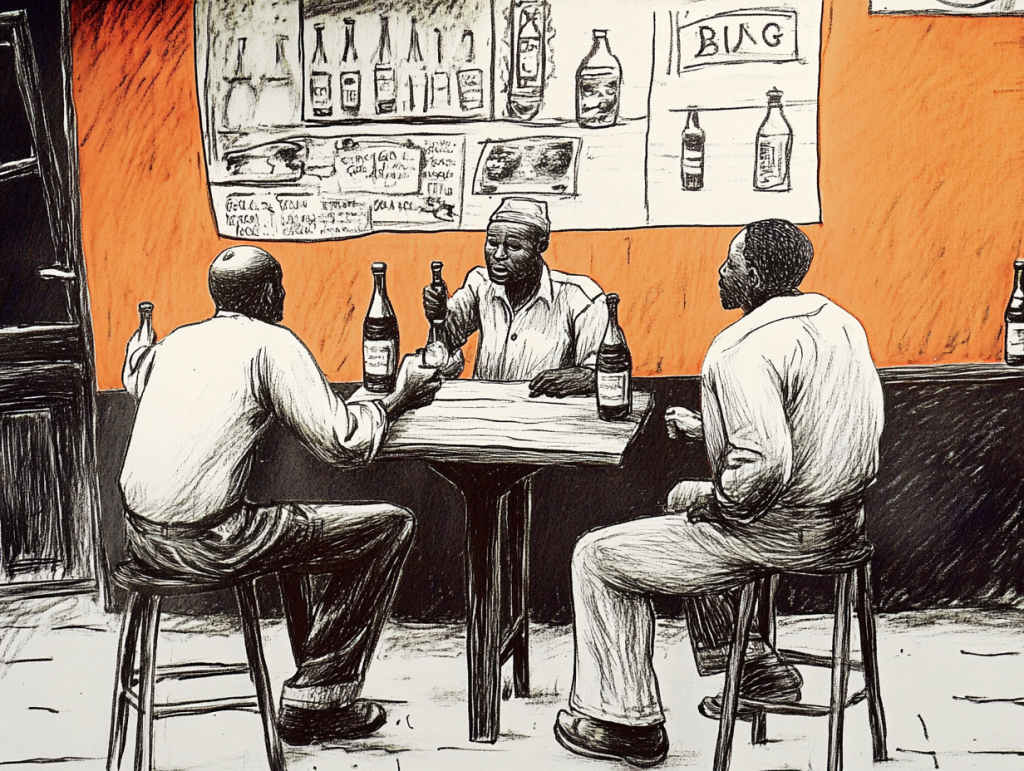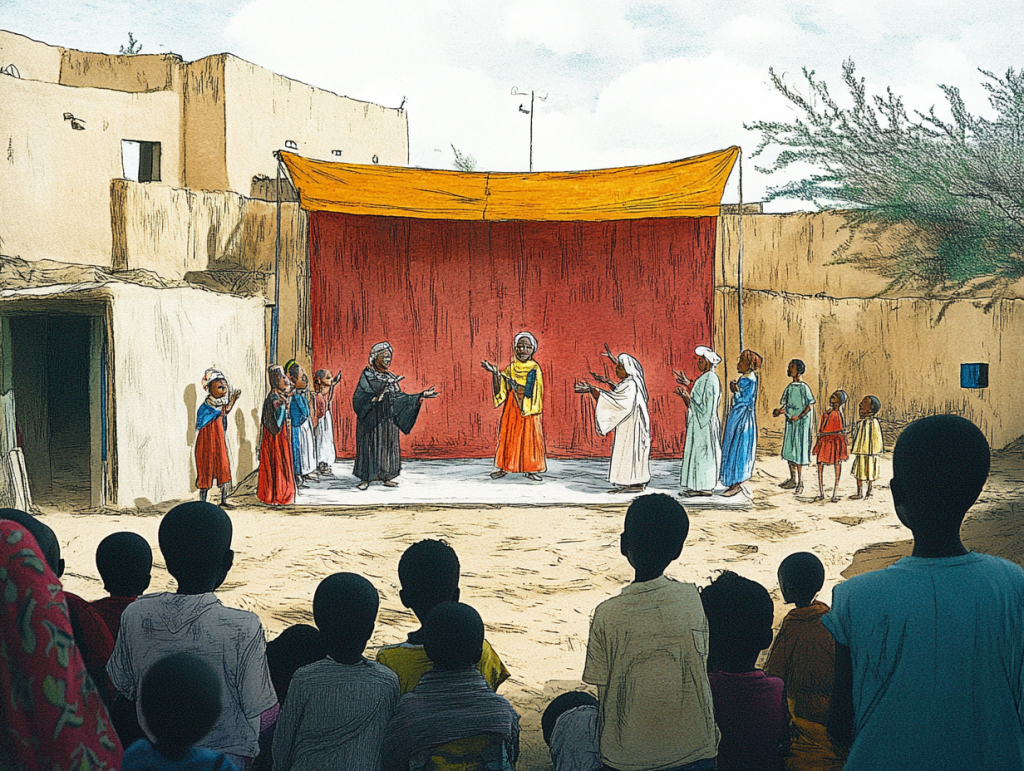
This podcast is an outcome of the workshop series ‘’Bon Buzz‘’. Bon Buzz challenges young Chadian journalists to bring nuance to polarising issues in society through personal stories.
Note: Transcripts are generated using a combination of speech recognition software and human transcribers, and may contain errors. Please check the corresponding audio before quoting in print.
Alhadji Bougar: It was 5.35pm on Thursday 24 October 2024 in Madjorio, a predominantly Muslim neighbourhood in the First Arrondissement. Wamba Barbara Kaïna, a Protestant Christian, was on her way home from the Klémat neighbourhood after she performed an interview to become a news presenter at Sahara TV, 4 hours away from her home. Her face was crumpled and tired, and it was difficult for her to answer her neighbours and satisfy even her nieces, aged between 4 and 5, who usually greeted her by running to carry her bag. Dragging her motorbike to the front of her room, she threw herself onto her carpet without changing her clothes, but she still had the courage to check on her Muslim friend Falamata Boukar. After a sip of water, she made a phone call
……….Sound of running water and a phone ringing
..
Wamba Barbara Kaina: Hello darling?
Falamata Boukar: Hello?
Wamba Barbara Kaina: All right, how are you?
Falamata Boukar: Yes, I’m fine, darling. Yes, I’d like to see you.
Wamba Barbara Kaina: I haven’t seen you for two days now.
Falamata Boukar: Unintelligible answer
Wamba Barbara Kaina: I haven’t seen you for two days now. Are you well?
Falamata Boukar: unintelligible answer
Wamba Barbara Kaina: No, I can’t leave you all the same?
Falamata Boukar: unintelligible answer
Wamba Barbara Kaina: No, I can’t leave you all the same?
Wamba Barbara Kaina: No, when did you call me? Maybe I was busy. If not, are you all right?
Wamba Barbara Kaina: Is he all right? That’s good, narabuja.
Alhadji Bougar: This is the story of the friendship between a Protestant Christian girl living in Farcha Madjorio and a Muslim girl in the Blabline or Marché à Mil neighbourhood in the fourth arrondissement. The two girls met ten years ago during a first-aid course run by Wamba Barbara Kaïna.
Wamba Barbara Kaïna: We met at the Red Cross in the 2nd arrondissement, where I was the course leader and she was a young participant. Falmatta approached me because I was their leader and she also wanted to learn songs:
…… Wamba Barbara Kaina sings Red Cross welcoming songs.
Wamba Barbara Kaïna: I’ve learned enough songs from Falmata and she was like my deputy. It was Falmata who first came to me. No, I don’t remember that day, but she came to my place. We spent the whole day togethe. Falmata, she’s a fun girl. I used to call her my madness, in any case Habibi, my love, all that. So she teases, she can just easily be in contact with someone.
Alhadji Bougar: The two friends, who affectionately call each other habibi, a name in Arabic that means my love, have confided in each other without setting any limits. The idea is to take this friendship all the way to where their parents live, in other words, their family concessions. It’s here that everyone will play their part, because many friendships are limited to the meeting place, because Christian and Muslim parents are suspicious of each other.
As Wamba Barbara Kaina explains, Falmata Boukar, the Muslim, was prejudiced when she first visited her Christian friend.
Wamba Barbara Kaina: Right from the start she was a bit scared, I don’t know, maybe she thought my parents were like any other family, she didn’t feel up to it and I didn’t ask why, I tried to erase what was going on in her head, so when I went out I went into the kitchen and called her falamata, take this, bring it to me, take this, give it to mum, take it to work. Dad called me, he needed this and that’s when I put them in touch with my parents. When the parents send me something, instead of me going to get it, I prefer Falmata to go and get it and then she gives it to them. It was after a few days because she had already started coming to my parents’ house all the time. I asked them where Falmata was from, I told them no, she’s a friend, we met at the Red Cross, she lives at the Marché des Milles. She lives at the Marché des Milles. At the Marché des Milles she comes all the time, so Dad asked me about it, and I said yes, my friends are all a bit far from me, but they do their best to come all the time.
Alhadji Bougar: What about Wamba when she first visited her Muslim friend Falmata?
Wamba Barbara Kaina: At first I was afraid to sing in their house. Then I realised I was afraid to sing because they weren’t the only ones at home. There were also the uncles there with their wives, it wasn’t just them. And I avoided singing because it was right from the start, I can’t confuse people too, I can’t make people feel uncomfortable. I just try to get into the room folded up, even in the presence of the mother or her brothers inside I take normally and then I sleep and then I’m free I can sing even until I go out I want to see my well-being I want to see jesus christ she really likes this song arrived at home sometimes even if I’m not there she sings to this song.
Alhadji Bougar: After a few moments of relationship, falmata’s mother would like to convert Wamba, something that falmata’s elder brother moustapha does not share.
Moustapha: On the subject of religion, my mum asked her if she could convert to Islam. She replied yes, I could convert, but tomorrow my parents are going to reject me, so give me time to think and I’ll give you an answer. Afterwards, I reproached my mother for not going into other people’s religions, because for other parents, if their child or their son or daughter converts to Islam, they will reject her by certain standards. If you want to do such things, you should first ask your parents for their opinion, but as time goes by, maybe you’ll learn how the religion is and that’s how you’ll do it.
Alhadji Bougar: Just as Falamata Boukar, the close friend, refuses the proposal according to what she says.
Falamata: My parents were talking about ending the relationship. I’m afraid our friendship will be broken.
Alhadji Bougar: A proposal that didn’t discourage Wamba, given the reaction of her friend. Their friendship was strengthened and they decided to discover their religions together, according to their testimonies.
Wamba Barbara Kaina: They often went to Koranic schools and then I followed them. I followed them because when they went there, I was alone at home. So I prefer to go with them. It’s just the stories. I see, in any case, I make comparisons between the biblical story and the Koranic one. In the Old Testament, the stories are the same. The same stories, when I listen to them, when they start explaining it all. I don’t see any difference, it’s the same explanations. They’d start with Bismillahirrahmanir Rahim, Alhamdoulilah, Rabbi Al-Alamin, all that.
Fatama: I went to church 4 or 5 times. We were together and her father told me that you Muslims say that we Sara don’t worship God. You can go to church with your friend and find out about our religion. I went. That day, she introduced me to the Christian worshippers who were at the sunday service. They introduced themselves to me and I introduced myself to them and then they prayed for me and I remembered one of their songs, but not all of it.
……..Singing a Christian song.
Alhadji Bougar: Since that day, the two families have united while respecting the religious choices of their children, as witnessed by Daou Natali Kaina, Wamba Barbara Kaina’s older sister.
Daou Natali Kaina: Yes, they often come and spend the night here. In the compound, we think of her as a sister. It’s not just her, it’s the whole family. We think more of them and they’re too attached to Wamba Barbara, so we think of Falamata as a sister to us. We think of them in the same way. When they’re together we don’t make any distinction between them, it’s never crossed our minds, no-one has opposed them or told Wamba to be careful about anything, no, no. She feels at ease. She feels at ease, even more so. She comes home, as I was saying, when there’s money to cook. Dad gives her the money, she goes to the market, she comes and cooks for us. Yes, we’ve got her room here, and we’ve also got the little rugs that I lean on too. We have those at home too. So every time, we put them at their disposal to pray.
Alhadji Bougar: It’s more than a family, not a friendship, as Wamba Barbara Kaina confirms.
Wamba Barbara Kaina: What Falmata mother is, and I even said once to my mother who is you there, what Falmata’s mother does to me. She even surpasses you. Sometimes, when I’m in trouble, she’s always there with me. She encouraged me when I was going off to university. Two or three days when I pass, she gives me the 10,000, she gives me the 5,000. She asks me if you take buses, if I eat well at university and if there are any problems with the food. And if there are any ceremonies, it’s Falamata’s mum who’s involved. Even if Falmata wanted to call me, she said no, I don’t want to call her, I want to surprise her, otherwise she’ll also look for the money to buy donors. She says you can come very early in the morning and when I come she asks me to go to the salon to get my hair done and afterwards I see some opinions I wear with my friends and then we leave she considers me as her own life. She doesn’t know the difference, even when you ask her if she’s the daughter of who’s achallah. She says no no it’s my daughter it’s my daughter ok is she here with you no she says she was somewhere he just arrived and now she lives in Farcha and the kid visits us all the time. She has never said to other people who is there I am the friend to his life or like that no.
Alhadji Bougar: From this friendship which is the trust between a Christian and Muslim family, Falamata the Muslim moved from the fourth arrondissement to Djougoulier in the first arrondissement.
Falamata Boukar: Falamata Kaina!
Note: This podcast is the result of a workshop and may be someone’s first production, it may therefore contain imperfections.




